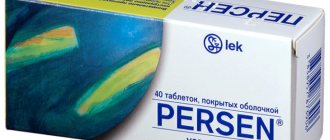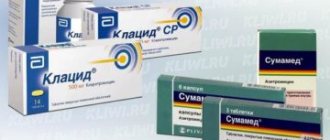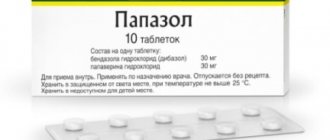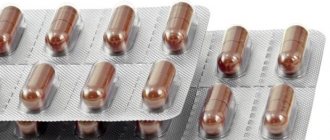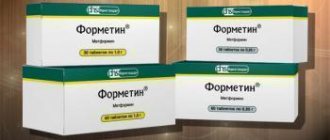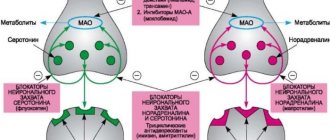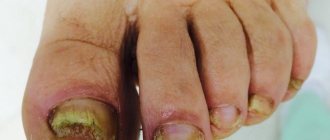Berlition is an antioxidant and hepatoprotective agent with hypoglycemic and hypolipidemic effects. Instructions for use will show how to properly take tablets or capsules of 300 and 600 mg, injections in injection ampoules for the treatment of hepatitis and cirrhosis.
Berlition 300 and 600
The main active component of Berlition, alpha-lipoic acid, is considered an antioxidant, the effect of which is aimed at binding free radicals that provoke the occurrence of malignant tumors. Under the influence of the medication, the level of glucose in the blood decreases, carbohydrate and fat metabolism are stabilized, and cholesterol returns to normal.
The drug has a pronounced antioxidant effect on the body, which improves blood circulation through the capillaries, stabilizes the functioning of the liver and increases the protective properties of hepatocytes.
Thioctic acid eliminates the effect of alcohol toxins on liver cells and human internal organs in general, and also reduces the likelihood of hypoxia and ischemia, eliminates pain, paresthesia, numbness of the legs and arms. What does Berlition help with?
Release form and composition
Currently, the drug Berlition is available in three dosage forms:
- Pills,
- Capsules;
- Concentrate for the preparation of solution for injection.
The tablets contain 300 mg of the active substance, and the concentrate for the preparation of solution and capsules - 300 mg or 600 mg. Moreover, the content of the active substance in the concentrate is always the same and amounts to 25 mg/ml. And the total dosage of the active component is achieved due to the volume of the concentrate in the ampoule: 300 mg is contained in 12 ml ampoules, and 600 mg in 24 ml.
To indicate the dosage of the drug, the simplified names “Berlition 300” or “Berlition 600” are often used. The concentrate for preparing the solution is often called simply “Berlition ampoules”. Sometimes you can hear about Berlition capsules, but there is no such dosage form today, and the person has in mind the version of the drug for oral administration.
As an active component, Berlition contains alpha-lipoic acid, which is also called thioctic acid. The concentrate for preparing the solution contains propylene glycol and water for injection as auxiliary components.
Berlition tablets are available in packages of 30, 60 or 100 pieces, 300 mg concentrate - 5, 10 or 20 ampoules, and 600 mg concentrate - only 5 ampoules.
The concentrate is contained in hermetically sealed transparent ampoules. The concentrate itself is transparent, greenish-yellow in color. The tablets have a round, biconvex shape and are yellow in color. There is a mark on one surface of the tablets. At the break, the tablet has an uneven granular surface, colored yellow.
Pharmacokinetics
Suction and distribution
With intravenous administration, Cmax is 25-38 mcg/ml and is achieved after 10-11 minutes, AUC is about 5 mcg x h/ml.
Vd - about 450 ml/kg.
Metabolism and excretion
Has a “first pass” effect through the liver. The formation of metabolites occurs as a result of side chain oxidation and conjugation. Thioctic acid and its metabolites are excreted in the urine (80-90%).
Why are Berlition 300 and 600 prescribed?
The drug is prescribed as an auxiliary therapy in order to accelerate intercellular energy metabolism, improve tissue trophism, and normalize carbohydrate and lipid balance in the body.
Berlition (alpha lipoic acid) is indicated for:
- atherosclerotic changes in the coronary vessels;
- anemia;
- hypotension;
- for pathologies of the liver and bile ducts;
- acute and chronic intoxications of various origins (poisoning with salts of heavy metals, poisons, alcohol);
- polyneuropathy of the upper and lower extremities (inflammatory, toxic, allergic, traumatic, diabetic, vegetative);
- organic disorders in the cells of the brain and spinal cord;
- endocrine pathologies associated with metabolic disorders.
Features of the drug
Berlition can significantly improve the cellular nutrition that neurons need. In addition, the medication has a beneficial effect on literally all processes occurring in the cells of the body.
Berlition tablets
This is extremely important, because without it one could completely forget about the possibility of preserving the structure of internal organs and tissues. Their functionality must be constantly maintained. This drug successfully copes with this difficult task.
Medical instructions for use
According to the instructions, the optimal dosage of Berlition tablets for diabetes mellitus complicated by neuropathy is 600 mg (2 tablets) per day. When taken orally, food significantly impairs the effectiveness of thioctic acid, so it is drunk strictly on an empty stomach, at least half an hour before meals. The tablets can be divided in half, but cannot be crushed.
Berlition tablets are intended for long-term use. According to neurologists, the minimum time of treatment after which you can expect the first results is 3 weeks. If necessary, the instructions allow you to take the drug for six months, after which it is advisable to take a break.
In severe cases, it is recommended to prescribe Berlition to the patient in the form of a solution for infusion.
Berlition in the form of a concentrate for the preparation of a solution for infusion is used for intravenous administration. Only 0.9% sodium chloride should be used as a solvent; 250 ml of the finished solution is administered over half an hour. Medication dosages:
- For severe diabetic polyneuropathy – 300-600 mg (1-2 tablets Berlition 300);
- For severe liver disease - 600-1200 mg of thioctic acid per day.
- For intravenous administration (injections)
- At the beginning of treatment, Berlition 600 is prescribed intravenously in a daily dose of 600 mg (1 ampoule).
Before use, the contents of 1 ampoule (24 ml) are diluted in 250 ml of 0.9% sodium chloride solution and administered intravenously, slowly, for at least 30 minutes. Due to the photosensitivity of the active substance, the solution for infusion is prepared immediately before use. The prepared solution must be protected from light, for example, using aluminum foil.
Read also: Why is Arbidol prescribed? Instructions, reviews and analogues, price in pharmacies
The course of treatment is 2 – 4 weeks. As subsequent maintenance therapy, thioctic acid is used in oral form at a daily dose of 300-600 mg.
Therapeutic effect
The active substance is a chemical compound belonging to the class of internal antioxidants of direct and indirect action. Capable of binding to free radicals to prevent tissue damage. It is considered a coenzyme compound in the decarboxylation of alpha keto acids. Stimulates a decrease in sugar levels in the bloodstream and an increase in the concentration of glycogen in the kidney tissue. It also reduces insulin resistance and helps regulate carbohydrate and fat metabolism. Strengthens the metabolism of cholesterol in the body.
Treatment under medical supervision
This antioxidant has a protective effect on cellular elements. Prevents tissue damage due to the release of metabolic products. Suppresses the formation of final derivatives of protein glycosylation in neurons against the background of diabetes. Strengthens blood supply through small blood vessels and blood circulation in the sheaths of nerve fibers. Increases the concentration of the natural antioxidant component, glutathione.
Additionally
- Causes a decrease in plasma sugar levels and thereby affects alternative glucose metabolism in diabetes mellitus, reducing the accumulation of harmful derivatives in the form of polyols. This leads to a decrease in swelling in the nerve area.
- Since Berlition is involved in the metabolic transformation of lipids, the active component of this drug increases the biological synthesis of phospholipids. It also increases the release of phosphoinositides, which stimulates the restoration of damaged cell membrane structures.
- Stimulates energy conservation and improves the passage of impulses in nerve fibers. Prevents the negative effects of toxins and metabolic derivatives of ethyl alcohol.
- Reduces the increased formation of oxygen free radicals and suppresses hypoxic processes in nerve fibers. It prevents ischemia from developing, since it weakens the symptoms of nerve damage in the form of sensitivity disorders, pain, burning and decreased sensation in the extremities.
This is a drug with one active ingredient and a combined therapeutic effect. Antioxidant properties, trophic effects on nerves and metabolic properties are present. The use of a chemical compound in the form of an ethylenediamine salt helps prevent the development of unwanted reactions.
Side effects
The use of the drug may cause the following side effects:
- From the gastrointestinal tract: dyspeptic disorders, nausea, vomiting, changes in taste, stool disorders.
- From the cardiovascular system: tachycardia (after rapid intravenous administration), flushing of the face and upper body, pain and tightness in the chest.
- From the side of the central nervous system: a feeling of heaviness in the head, diplopia, convulsions (after rapid intravenous administration).
- Allergic reactions: itching, skin rash, urticaria, eczema. In rare cases, anaphylactic shock may occur.
Symptoms of hypoglycemia, headache, excessive sweating, dizziness and visual disturbances may also occur. Difficulty breathing, purpura and thrombocytopenia are sometimes observed. At the beginning of treatment, patients with polyneuropathy may experience increased paresthesia with a sensation of goosebumps crawling all over the body.
Overdose symptoms
One of the most unpleasant effects is an overdose. It has a number of different symptoms, so it is extremely easy to calculate.
Among the most common symptoms of overdose are:
- tissue destruction;
- muscle contractions;
- brain disorders;
- nausea and headache;
- acidosis;
- psychomotor disorder;
- decrease in the amount of glucose;
- hemolysis;
- dysfunction of organs.
In some cases, seizures have been observed due to the use of the drug. They can be extremely dangerous, so those who have encountered this trouble at least once in their life should undergo a full medical examination. This will identify any problems that may be worsened by the use of this medication.
If for any reason the patient takes too many tablets, he is at risk of intoxication. In the end, everything can end in death.
In order to prevent such an unpleasant scenario, you need to carefully read the instructions, consult with a doctor, and also study all the available information on the Internet. Only this can save you from improper use of the medication.
Analogs
- Alpha lipoic acid;
- Lipamide;
- Lipoic acid;
- Lipothioxone;
- Neurolipon;
- Octolipen;
- Thiogamma;
- Thioctacid 600;
- Thioctic acid;
- Thiolepta;
- Thiolipon;
- Espa Lipon.
When choosing analogues, you must remember that the instructions for use of Berlition, the price and reviews of drugs of similar effect do not apply. Replacing the drug is permissible only after the recommendation of a doctor.
Contraindications
Berlition has the following contraindications for use:
- age under 18 years;
- pregnancy or lactation period;
- lactose intolerance;
- presence of hypersensitivity;
- intolerance to any components of the medication.
If you have any of the listed contraindications, you should refrain from using Berlition. If this is not done, complications are possible.
Moreover, a drug that helps restore health can turn into a drug that only causes harm to the body.
To ensure that contraindications or side effects do not cause significant harm to the body, you should follow the instructions. It is there that all the features of the medicine are spelled out, as well as how best to use it.
Traditionally, the dosage (as well as the route of administration) depends on the form of the medication and the disease. Typically, infusions or injections are needed during the treatment of neuropathic conditions. Tablets are prescribed in the remaining cases.
There are exceptions, but you must first (before using the drug) consult with your doctor. Only he can draw a conclusion about the advisability of using a particular medication.
special instructions
At the initial stage of treatment, patients with diabetes mellitus need to monitor glucose levels 1-3 times a day. If the sugar concentration has decreased to the lower limit, then the dosage of hypoglycemic agents or insulin should be reduced.
If an allergic reaction occurs in the form of itching or malaise when the solution is administered intravenously, the procedure must be stopped immediately. Too fast an infusion causes a feeling of heaviness in the head, convulsions, and double vision. There is no need to discontinue the drug; these symptoms disappear on their own.
Indications for Berlition
This is a metabolic drug to prevent the negative effects of harmful metabolic products on nerve fibers due to elevated blood sugar levels or alcohol intoxication in the body. Helps avoid the development of serious complications. Used alone or together with other medications only under the supervision of a physician.
Infusion option
Main indications
The only indications for the use of Berlition include polyneuropathy due to diabetes mellitus or alcohol intoxication. To carry out treatment using this remedy, you need to contact a neurologist or a specialist in another field. Examinations are carried out to select a safe and effective drug therapy regimen. You should not self-medicate.
Drug interactions
Berlition chemically interacts with ionic metal complexes, and therefore can reduce the severity of the clinical effects of drugs that contain them, for example, Cisplastin, etc.
Due to the ability to react chemically with metal ions, it is not recommended to take magnesium, iron or calcium supplements after taking Berlition, since their absorption will be reduced. In this case, it is recommended to take Berlition in the morning, and preparations containing metal compounds in the afternoon or evening. The same goes for dairy products containing large amounts of calcium.
Alcoholic drinks and ethyl alcohol contained in various tinctures reduce the effectiveness of Berlition.
Berlition concentrate is incompatible with solutions of glucose, fructose, dextrose and Ringer's, since thioctic acid forms poorly soluble compounds with sugar molecules.
Berlition enhances the effect of hypoglycemic drugs and insulin, therefore, when used simultaneously, it is necessary to reduce their dosage.
What do the reviews say?
The drug Berlition 300 and Berlition 600 in any dosage form (injection solution, tablet capsules) is quite often and, importantly, successfully used for the treatment of patients with diabetes mellitus and liver pathologies.
Reviews of Berlition on forums, among patients who have been treated with its use, as well as reviews of doctors prescribing this medication, are positive in 95% of cases and indicate not only the excellent results of the therapy, but also the virtual absence of negative side effects of such treatment .
Naturally, only a specialist doctor can prescribe Berlition and only when its use is really necessary.
726
Application area
Berlition 600 is used to treat two forms of polyneuropathy:
- diabetic;
- alcoholic.
Although the official instructions do not provide information about other indications for the use of Berlition 600, from my medical experience I can say that the drug is also effective in the treatment of liver pathologies, as it has a hepatoprotective effect. Thioctic acid helps cope with chronic intoxications of the body of various origins. Due to its antioxidant and neurotrophic (protecting nervous tissue) effects, it is advisable to use it for osteochondrosis and atherosclerosis.

